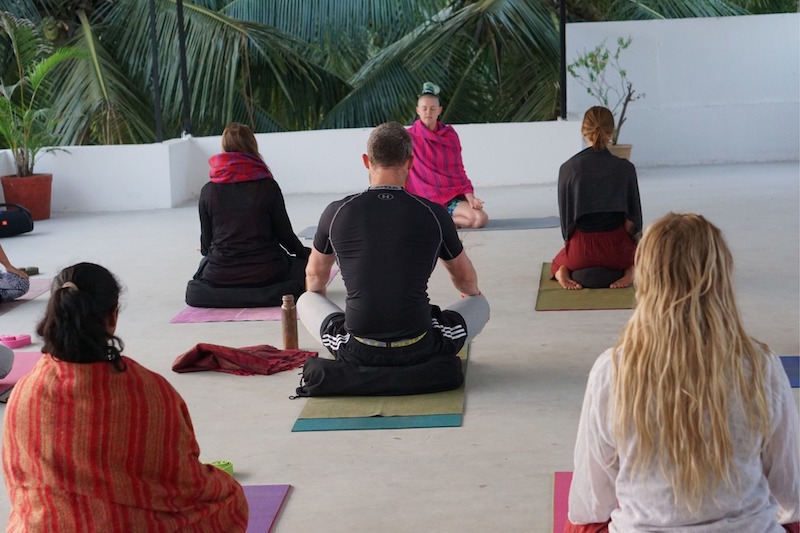Guest post by Katie Pierce
Stress can manifest itself in different ways. There are the usual skin concerns, such as acne, that serve as a sign that you’re under a lot of pressure. You might also find yourself more easily irritated by small matters if you’re severely stressed. You might even feel run-down much of the time.
So between work deadlines and the many tasks on your to-do list, taking a break for self-care is a must. Otherwise, you might not be able to perform well in the many areas of your life.
While everyone has their own way of recharging, meditation has been shown to be an effective way to minimize anxiety and stressful thoughts.
Here’s a quick overview of meditation to help you boost your own self-care routine.
What is Meditation?
Put simply, meditation is a way to turn your attention toward specific thoughts in such a way that calms your mind.
In this fast-paced world, practicing an activity that helps you slow down and take time to breathe can be beneficial. Once you are comfortable meditating, it can offer much more than simply de-stressing.
You can actually get to know yourself better through meditation. It’s a chance to deep-dive into your innermost thoughts — a way to understand your perspective in a much clearer way. Such a newfound clarity can also change the way you go about your day-to-day activities.
Different Ways to Meditate
Meditation can be overwhelming at first, especially for those who may not be too familiar with this practice. A great part of it, though, is that you can make meditation as personal as you’d like. There are also many different types of meditation — you get to choose one that fits your personality and your goals.
Zen Meditation
This type of meditation has its roots in Buddhist psychology. It requires sitting in a crossed-leg position, while focusing the attention inwards. During the process, it’s also important to maintain a correct posture. In Zen meditation, a general awareness of one’s surroundings is also essential. The main objective of this type of meditation is to increase awareness of your own preconceived notions, as well as gain insights into yourself.
Mindfulness Meditation
In mindfulness meditation, you keep bringing your attention back to a simple object such as the breath, or an action such as walking or washing dishes. When your mind wanders, you come back to the object or action.
When practicing mindfulness meditation, it is important to turn off anything that may serve as a distraction. This includes any mobile devices, your laptop and the TV — anything that might shift your focus away from meditation. Eventually, you will be able to naturally focus without being distracted by thoughts of anxiety or worry.
Guided Meditation
In this type of meditation, you practice a specific visualization. Guided meditation is commonly used by those who are trying to achieve a specific outcome. If, for example, you’ve been worrying about a huge presentation at work, you can try to imagine the outcome. Visualize yourself doing well, specifically the way you’d feel in the moment.
Transcendental Meditation
This sort of meditation involves repeating a specific mantra, or phrase. As with the other types of meditation, any kind of distraction needs to be minimized. Try to set aside around 10-15 minutes in a comfortable area. The mantra you choose doesn’t have to be too long. As long as it inspires you, you may use it.
Other Self-Care Activities
If you think you’re not the type to meditate, there are still a lot of other self-care activities that can help with anxious thoughts or worries. These include:
- For women, worrying about menstruation leaks can be an added stress. Using period underwear can get rid of the extra worry.
- Eating a healthy meal can actually do wonders for your mental health. The same goes for exercising regularly and going outside for a walk.
- Drinking water — or a warm cup of tea — can also help you destress.
- Even something as simple as taking a shower or a bath can lift your mood, if just for a while.
- Mentally-stimulating activities can serve as good ways to take care of your mental health. You can try any of the hobbies you currently have. Maybe curling up and reading your favorite book would be a great way to take a break. Listening to music or an educational podcast can also help you rest.
- You could even take up journaling. There are also gratitude and reflection journals that allow you to become more mindful of your own thoughts and emotions on a regular basis.
Mindset Change
Ultimately, practicing regular self-care requires a change in your mindset, including committing to taking care of your mental health.
It’s also important to know your own limits, especially when it comes to feeling burned out or stressed. So before you reach the brink of exhaustion, take a moment to recharge.
After all, you deserve to be mentally healthy — without feeling guilty for trying to take care of yourself.
Katie Pierce is a teacher-slash-writer who loves telling stories to an audience, whether it’s bored adults in front of a computer screen or a bunch of hyperactive 4-year-olds. Writing keeps her sane (most of the time) and allows her to enjoy some quiet time in the evening before she walks into a room of screaming kids (all of whom she loves dearly) the next morning.
_____


